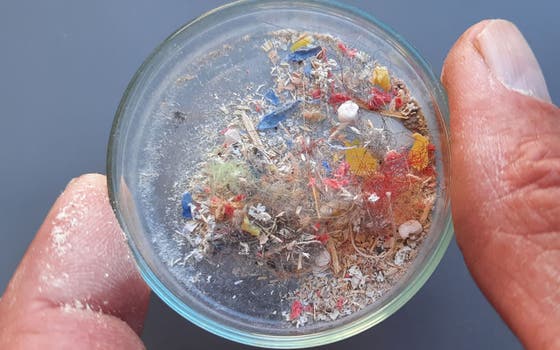Research into plastic in the human body

Small plastic particles are found everywhere in our environment. We ingest them through the food we eat, the water we drink or the air we breathe. What does this mean in terms of our health? A matter of great concern throughout the world. Now a European research cluster of scientists, industry and policy makers will investigate the effect of these plastics in the human body.
Microplastics and nanoplastics (MNPs) are formed from the degradation of larger plastic objects and from the wear and tear of medical implants and car tires, for example. They are also found in commercial products such as cosmetics, synthetic textiles or paints. Despite the presence of these plastic particles all around us, we still know very little about exposure of the population. We also do not yet understand where they end up in our bodies and what effects they have on our health. To investigate this, the European research cluster (CUSP) is receiving 30 million euros from the European Commission. Over the next five years, CUSP researchers will develop methodologies in five major projects that will allow them to measure MNPs in air, water, food and in the body, and to assess hazards and risks to human health.
Five CUSP projects
“Complex phenomena, such as the global presence of MNPs in our environment, can only be effectively addressed by joining forces and tackling them on a large scale," says Roel Vermeulen, Professor of environmental epidemiology and exposome analysis at the UMC Utrecht and Utrecht University. In an online networking event organized by the 2021 EU Green Week, Roel explained: “Bringing together five research initiatives into one big cluster is going to be of tremendous help in finding the scientific evidence we need to perform a thorough risk assessment.” In total, more than ten researchers from Utrecht are involved in the CUSP cluster. The UMC Utrecht and Utrecht University coordinate two of the five CUSP projects: AURORA and POLYRISK.
AURORA – Pregnancy and early life
Do tiny plastic particles in our bodies have a harmful effect on pregnancy and early life? This research question is the subject of the AURORA project, which is coordinated by Roel from UMC Utrecht. “In this project we are developing new measurement methodologies to measure micro- and nanoplastics in human tissue and then using these to detect any plastic particles in placentas, blood and umbilical fluid," says Roel. Vice-coordinator Dr Virissa Lenters adds: “We use toxicological test systems to investigate whether micro and nanoplastics can cross the placental barrier and trigger harmful biological reactions. By combining these molecular-level insights with our human health impact studies we hope to shed light on the risks of micro- and nanoplastics in early-life health.” With eleven partners, including Utrecht University, from eight European countries and one partner from the United States, this international and interdisciplinary AURORA project will run for five years.
POLYRISK – airways and lungs
In POLYRISK, the CUSP project coordinated by Utrecht University, researchers are unraveling the risks of microplastic and nanoplastic particles, which are likely to enter our bodies from the environment through inhalation and ingestion. “From animal studies and tests with in vitro human immune cells, we know that small airborne plastic particles can cause respiratory tract irritation and lung abnormalities. However, specific protocols for assessing these risks do not yet exist and essential data is lacking, which prevents us from making scientifically sound decisions," says Associate Professor Raymond Pieters of Utrecht University, Institute for Risk Assessment Sciences, who is coordinating this project. “We're going to explore that in POLYRISK using all sorts of methods. We will focus on key toxic events linked to several chronic inflammatory diseases.” Co-researcher and Assistant Professor Nienke Vrisekoop of UMC Utrecht: “In this way, our POLYRISK project can help ensure that public health is better protected from the potential risks of MNP contamination.” Fifteen partners from seven countries are participating in POLYRISK, which will run for four years.
More information about the CUSP cluster, its five projects and the kick-off meeting with the European Commission during the EU Green Week: link and the CUSP website
AURORA project: www.auroraresearch.eu
POLYRISK project: https://polyrisk.science/
AURORA is supported by the Research Support Office project management team of the UMC Utrecht.
Press Release
From early life tot adulthood: what's the impact of micro- and nanoplastics in the human body?
The CUSP cluster is a newly funded EU initiative to answer key micro- and nanoplastics related questions on human health and provide policy-relevant scientific data.
June 11th, 2021: 75 organizations from 21 countries forming five large-scale projects came together to give birth to the European research cluster to understand the health impacts of micro- and nanoplastics, CUSP. Funded by the European Commission with EUR 30 million, a multidisciplinary team of scientists, industry and policymakers will collaborate in this unprecedented research effort over the next five years. Within CUSP, the different projects will investigate the complex relationship between micro- and nanoplastics (MNPs) and human health. The team will be focusing in particular on exposure routes, hazard and risk assessment, and the development of new analytical tools to measure, characterize and quantify MNPs. A large audience of stakeholders and interested citizens logged in on June 9th, to launch CUSP in an online kick-off meeting with CUSP project members and representatives from the European Commission.
> Read more
Foto:
‘Copyright © Dick Vethaak’
